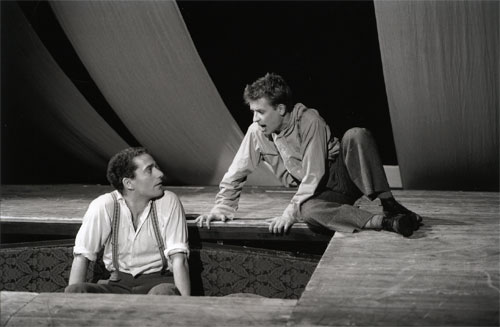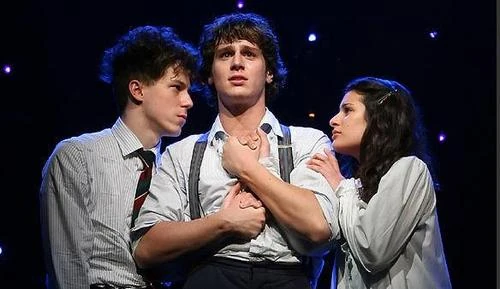No edit summary Tag: Visual edit |
Tag: Visual edit |
||
| Line 80: | Line 80: | ||
== Personality == |
== Personality == |
||
| − | Melchior is gifted, charming, and very reflective, but he doesnt know when to pull out. now theres a 14 year old pregnant. fuck you cumboy. this is why we have sex ed. Melchior often questions the world and his place in it. He is very critical of Christianity and its ideology. His personality differs between the play and musical; in the play he is significantly more self-absorbed and arrogant. He has a desire for control within relationships. He discovers that he has an explosive temper, and this frightens him. He is very outspoken. He cares deeply for his friends in the musical, as shown when he stands up for Moritz,his bf in Latin class even though it results in a beating from his teacher. However, he often fails to consider how others feelings might differ from his own and is pretty self-absorbed. |
+ | Melchior is gifted, charming, and very reflective, but he doesnt know when to pull out. now theres a 14 year old pregnant. fuck you cumboy. this is why we have sex ed. he is also very dumb when it comes to feelings. it's very clear that spring awakening's e-boy, moritz, has a crush on cumboy. but cumboy is a little bitch and accidentally causes a pregnancy instead. yet again, fuck you melchior "cumboy" gabor. Melchior often questions the world and his place in it. He is very critical of Christianity and its ideology. His personality differs between the play and musical; in the play he is significantly more self-absorbed and arrogant. He has a desire for control within relationships. He discovers that he has an explosive temper, and this frightens him. He is very outspoken. He cares deeply for his friends in the musical, as shown when he stands up for Moritz,his bf in Latin class even though it results in a beating from his teacher. However, he often fails to consider how others feelings might differ from his own and is pretty self-absorbed. |
== Fun Facts == |
== Fun Facts == |
||
Revision as of 03:13, 23 June 2020
Melchior Gabor is the protagonist of Spring Awakening. He is the only one out of the three leads (himself, Wendla Bergman and Moritz Stiefel) who survives. Jonathan Groff played Melchior in the Original Broadway Cast. He was played by the actor Austin P. McKenzie in the 2015 Deaf West Broadway revival. His characterization in the musical differs slightly from the source material, Frank Wedekind's play of the same name.
Background
Melchior Gabor is a proffesional twink living in Germany in 1891. He is angery grr because he understands that the society in which he lives is hiding information from its youth "What the fuuuck is this god,Its pizza roll Monday yet my mother WONT GIVE ME FUCKING PIZZA ROLLS. Melchior is often described to be a bitch, A fuckboy, and headstrong, and is noted to be a top. He is well-liked among his peers, but his teachers fucking hate him,cause one time he just left class,walked outside,showed them the middle finger and slut dropped to the ground. Melchior comes from a stable home, and has a very close relationship with his mother (Fanny Gabor). Frau Gabor stands out amongst the other parents due to her open-mindedness and liberal views. Melchior has a fascination with human morality and ethics, and often journals his ideas. Him and Moritx get stoned on his roof,one time Moritz got too high and fell off and proceeded to break his leg.
Plot
Revolting, Realism and Reality
Melchior is the first of the boys to fully understand the nature of the human body and its changes as a result of puberty. "While all the other boys are oh so scared off boobies,I myself have actually TOUCHED a boobie,so take that HANSCHEN." -Melchior Gabor
This is reiterated in the musical throughout the song The Bitch of Living- while the rest of the boys express a lack of understanding about their sexual and worldly frustrations (and the general angst of going through puberty,so angsty,so edgy), Melchior answers their pleas. Melchior realizes that not everything that the boys were taught in school was completely accurate and that society had missed certain subjects out. The adults did this so that the boys wouldn't ask questions and doubt their ideology.
Moritz and Melchior
The "friendship" (cough cough they're probably somewhat gay for each other) between Melchior and Moritz Steifel began at an early age. Despite the boys' differing social statuses, they remained very good friends, much to their peers' confusion. Namely, Herr Knockenbruch and Fräulein Knuppledick think it "unfathomable" that Melchior, someone with "thoroughly distinct capabilities," would choose to spend his time with Moritz, a "sleep deprived,tall,kinda dumb bitchass motherfucker."
Moritz explains with horror and confusion to Melchior that he has been experiencing "sticky dreams," which Melchior reassures him are perfectly normal and happen to all boys their age. Moritz requests a more thorough explanation, which Melchior provides in the form of a ten-page essay entitled "The Art of Sleeping With," complete with detailed illustrations of male and female genitalia (ooh an artist). This essay circulates throughout the school. In the play, he is uninterested in how the girl is feeling, but in the musical he is fascinated by it, actively putting himself in that place for the essay (does Melchior Gabor bottom??). The essay is used as evidence to get Melchior expelled after Moritz commits suicide,rip, as the essay is seen as proof of not only Melchior's corruptions, but Melchior's 'motivation' to corrupt his peers.
Wendla and Melchior
Wendla and Melchior's relationship is central to the plot. As children, they often participated in community service activities together through the church, but as they grew older, opportunities to interact became very infrequent. They are drawn together by a need to debate and question their society, and they challenge each other with their reasoning and ideas. There is a feeling of mutual understanding between them that they have not found in others. They flirt innocently, holding hands and taking walks together.
After Wendla learns that her close friend Martha is frequently physically abused by her father, she asks Melchior to beat her with a wooden switch. Melchior initially refuses, appalled by the idea of hurting her. After Wendla continues to insist, he reluctantly obliges. At first he does not put any force into it, but he suddenly becomes enraged and beats her in earnest, leaving Wendla curled up on the ground in tears. Melchior is horrified by what he has done, and runs away. It is unclear whether or not this was a sexually motivated act of sadomasochism, (though Melchior's later line, "Something started in me, when I hit you." may suggest this).
The Hayloft
After recovering, Wendla finds him alone in the hayloft. Melchior asks her to leave, as he cannot bring himself to face her again after knowing how badly he hurt her (and, in some productions, it is implied that he had been masturbating and he doesn't want her to see him in such a state). Wendla says that she does not blame Melchior, and that it was her fault for asking in the first place. Melchior attempts to kiss her, but she pulls away, believing that it is wrong for them to engage in such activity. Melchior persists, believing that she clearly desires him but that the morals their society has instilled in her are preventing her from reciprocating. Wendla gives in, and they ultimately have sexual intercourse.
There is a much debate over whether or not Melchior raped her. In the play, it is clear that their encounter was entirely non-consensual. However, the musical is much more ambiguous, as much of the scene is non-verbal and relies heavily on the direction and the physical actions of the actors.
That being said, Melchior exploits her attraction to him and instead of letting them be equals and explore this feeling together he overpowers her. This comes from an already stated desire by him (in the play) to have something he "has to fight for." He tells Moritz that he doesn't want his "bliss to come as charity." In the musical, he says (of a woman having sex) "defending [herself] until finally [she] surrender[s] and feel[s] heaven break over [her]". It is unclear if this is referring to the physical or emotional aspect of sex, and is quite possible that Melchior thinks that it refers to both and/or that the two are intertwined.
His 'rape' of Wendla and his subsequent lack of remorse (as seen through his longing to be with her again) is proof to his mother that Melchior is not as innocent as she wants to believe, and so, she allows her husband to send him off to a correctional/reformatory school. In both the play and the musical, the intercourse led to Wendla getting pregnant and dying from a botched abortion.
To note, in the play Melchior is later remoseful once being sent to the reformatory. He claims to know Wendla cannot forgive him and he cannot undo what he has done. He says he has taken away her freedom and that she hates him. There is no verbal equivalent of this in the play allowing for more choice from the actor. However, stage directions suggest a similar epiphany
"(Melchior realizes, in numbed disbelief, what must have happened,)
Oh my God. Wendla, too? No. No. No ...
(He doubles over, bereft. Spare piano chords-an otherworldly music begins) "
Those You've Known
In the play, Melchior is escaping his school and runs into a graveyard to see Moritz's grave. There he is greeted by Moritz's and his hamster,Aaron Tviet,s piss. Moritz tries to escort Melchior to the afterlife to play monopoly, however, he fails as a Masked man appears and promises Melchior food and salvation from his corruption in exchange that he will not take his own life, Melchior agrees and promises Moritz that he can take his hand when he is older and ready to depart from this world,and that they can play monopoly AND tivial pursuit,but gay when hes one with miss keesha and fucking dies.
In the Musical the salvation 'deus ex machina' archetype is, perhaps, best encapsulated by Wendla rather than the Masked Man. Throughout the musical, Wendla had taught Melchior much about love allowing him to understand that he has not failed, nor is he a bad person, this emotional connection to those he cares about was the knowledge he yearned for at the start of the musical in All That's Known. Therefore the tune of the music is reprised, emphasising Melchior's growth -his spring awakening-.
Personality
Melchior is gifted, charming, and very reflective, but he doesnt know when to pull out. now theres a 14 year old pregnant. fuck you cumboy. this is why we have sex ed. he is also very dumb when it comes to feelings. it's very clear that spring awakening's e-boy, moritz, has a crush on cumboy. but cumboy is a little bitch and accidentally causes a pregnancy instead. yet again, fuck you melchior "cumboy" gabor. Melchior often questions the world and his place in it. He is very critical of Christianity and its ideology. His personality differs between the play and musical; in the play he is significantly more self-absorbed and arrogant. He has a desire for control within relationships. He discovers that he has an explosive temper, and this frightens him. He is very outspoken. He cares deeply for his friends in the musical, as shown when he stands up for Moritz,his bf in Latin class even though it results in a beating from his teacher. However, he often fails to consider how others feelings might differ from his own and is pretty self-absorbed.
Fun Facts
- Melchior refuses to go to church and identifies as an atheist.(congrats on coming out kween)
- Melchior's favorite book is 'Mob School Survivor:The Creeper Diaries,An Unofficial Minecrafter's Novel.
- In the musical, he is at the top of his class. In the play, he's third but could be first "if he tried".
- Many characters call him by the nickname 'cum boy', including Wendla and Moritz.
- this is a reference to the fact that he literally cannot pull out and that, my friends, is why we have sex ed in school.
- There are productions of the show that explore potential gay subtext within Melchior and Mortiz's relationship. In the play there's a decent amount of gay subtext surrounding the pair, especially with the metaphor of the Headless Queen, wherein Moritz is the headless queen and Melchior--constantly at war with himself--would be the king with two heads
- Gavin Creel played Melchior in the workshop recordings. Jonathan Groff and Gavin Creel later dated, meaning Melchior dated Melchior.
- In the play and in the musical his age is ambiguous, though he's at least a year younger than Moritz in the play and it's assumed that Sater imagines him as 14-15 in the musical
- Frank Wedekind's style of expressionism meant that Melchior's poignant journey from valuing facts and science to valuing love was reflective of the times unstable zeitgeist, demonstrating the changing values of societies outlook from Modernism to Post-modernism
- the play was written in 1891, but interestingly only became widely uncensored in the 1970s during height the Post-modernist epoch (1945-1989).
- Melchior has a piss kink
- One night Moritz woke up to melchior,outside of his house with a boombox,blasting super bass while shouting up at Moritz "PISS IN MY MOUTH PISS IN MY MOUTH PISS IN MY MOUTH"
- Melchior he likes,fingers in his ass.
- His favourite day is sunday,as its fingers in his ass sunday.




















